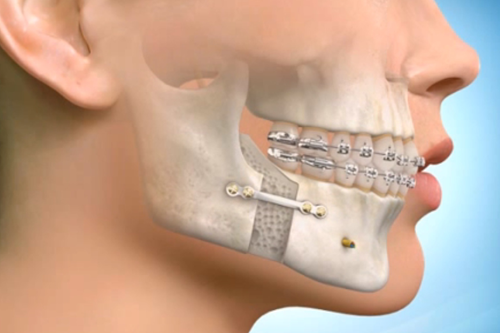
Jaw surgery, often called orthognathic surgery, corrects jaw bone defects and realigns the jaws and teeth to improve their function. These changes may also help improve your facial appearance. If you have jaw difficulties that cannot be remedied with orthodontics alone, jaw surgery may be a possibility.
To know more, consult a dental doctor near you or visit the best dental hospital in Pune.
Why Is Orthognathic Surgery Conducted?
- Makes biting and chewing easier.
- Corrects difficulties with swallowing and speaking.
- Fights tooth disintegration and excessive wear.
- Corrects bite fit or jaw closure issues, such as when the molars touch but the front teeth don’t (open bite).
- Treats facial asymmetry, such as small chins, underbites, overbites, and crossbites.
- Improves your ability to close your lips comfortably.
- Addresses pain can be caused by temporomandibular joint (TMJ) abnormalities and other jaw issues.
- Restores birth defects, combats facial traumas.
- Reduces obstructive sleep apnoea (OSA).
What Are the Risks Associated with Orthognathic Surgery?
When performed by a skilled oral and maxillofacial surgeon in consultation with an orthodontist, jaw surgery is generally safe.
Surgical risks may include:
- Infection and blood loss
- Nerve damage
- A broken jaw
- The jaw returns to its previous position
- Jaw joint soreness and problems with bite fit
- Additional surgery is required.
- On some teeth, root canal therapy is required.
- A piece of the jaw is missing.
After surgery, you may experience:
- Swelling and pain
- Nutritional supplements or a consultation with a dietitian can help with eating problems.
- A period of adaptation to a new facial look
What Are the Results of Orthognathic Surgery?
Jaw surgery can correct the alignment of your jaws and teeth, resulting in:
- Your lower face appearing balanced
- Teeth that are more functional
- Improved sleep, breathing, chewing, and swallowing
- Elimination of speech deficits
Other advantages of jaw surgery include:
- Enhanced appearance
- Increased self-confidence
Conclusion
After surgery, initial jaw healing takes around six weeks, but complete healing can take up to 12 weeks.
Your orthodontist will finish straightening your teeth with braces when your jaw has healed for roughly six weeks. It is possible that the full orthodontic procedure, including surgery and braces, will take many years. Retainers may be utilised after the braces are removed to maintain tooth position.
Request an appointment at Apollo Dental, Pune. Call 1800 1020 288 to book an appointment OR click on this link.
The surgery is performed under general anaesthesia, so there is no pain during surgery. Patients usually experience pain after the anaesthesia wears off, which can last for a few days. This can be managed with painkillers.
It is mostly a safe procedure when done by an efficient and skilled oral and maxillofacial surgeon. If performed by an inexperienced surgeon or orthodontist, risks of surgery may include relapse of the jaw, jaw fracture, nerve injury, infection or excessive blood loss.
Orthognathic surgery is needed when jaws and teeth don’t meet correctly. Repositioning the jaws so that the teeth meet (occlude) correctly jaw joint function and chewing (mastication) ability.
Recent studies have shown that orthognathic surgery has more than a 90% success rate when treating sleep apnoea patients. There are variations of orthognathic/jaw surgery.



















































